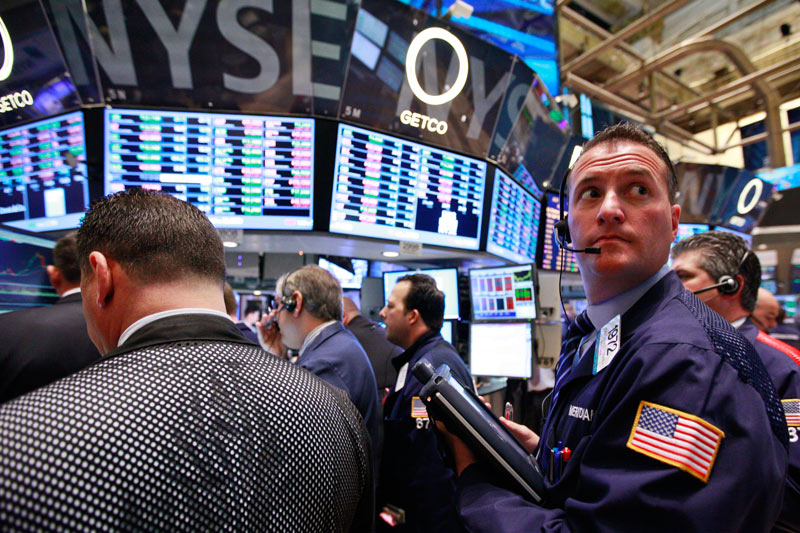Investing.com - U.S. stocks fell in lackluster trading on Friday as investors digested mixed economic indicators on the sidelines while awaiting fresh clues from the Federal Reserve as to when stimulus measures will begin scaling back.
Stimulus measures tend to inflate stock prices by keeping interest rates low.
At the close of U.S. trading, the Dow Jones Industrial Average finished down 0.20%, the S&P 500 index fell 0.33%, while the Nasdaq Composite index fell 0.09%.
Mixed economic indicators repelled many investors from stocks on Friday, especially after consumer sentiment data missed market expectations.
The Thomson Reuters/University of Michigan's preliminary consumer sentiment index fell to 80.0 in August from 85.1 in July. Analysts were expecting the index to rise to 85.5 this month, and the numbers edged stock prices lower as consumer spending drives about 70% of the U.S. economy.
Elsewhere, the Commerce Department reported earlier that U.S. building permits rose 2.7% to 943,000 units in July, disappointing expectations for an increase of 2.9% to 945,000 units although June's figure was revised up to 918,000 units from 911,000.
The government added that housing starts rose 5.9% to 896,000 units in July, missing expectations for a 8.3% increase to 900,000 units. Still, June's figure was revised up to 846,000 units from 836,000.
Not all U.S. data missed expectations.
The Bureau of Labor Statistics said in a preliminary report that nonfarm productivity rose 0.9% in the second quarter, beating expectations for a 0.6% gain after a 1.7% decline in the previous quarter.
Trading was quiet.
While the day's data painted a picture of an economy that is improving, though doubts remained in equities markets as to when the Federal Reserve will begin tapering stimulus measures, especially its USD85 billion bond-buying program that pushes up stock prices arguably by design.
Leading Dow Jones Industrial Average performers included Hewlett-Packard, up 1.85%, Boeing, up 0.73%, and Bank of America, up 0.70%.
The Dow Jones Industrial Average's worst performers included Verizon, down 1.65%, Pfizer, down 1.46%, and Cisco, down 0.82%.
European indices, meanwhile, finished higher.
After the close of European trade, the EURO STOXX 50 rose 0.57%, France's CAC 40 rose 0.75%, while Germany's DAX 30 finished up 0.19%. Meanwhile, in the U.K. the FTSE 100 finished up 0.26%.
Stimulus measures tend to inflate stock prices by keeping interest rates low.
At the close of U.S. trading, the Dow Jones Industrial Average finished down 0.20%, the S&P 500 index fell 0.33%, while the Nasdaq Composite index fell 0.09%.
Mixed economic indicators repelled many investors from stocks on Friday, especially after consumer sentiment data missed market expectations.
The Thomson Reuters/University of Michigan's preliminary consumer sentiment index fell to 80.0 in August from 85.1 in July. Analysts were expecting the index to rise to 85.5 this month, and the numbers edged stock prices lower as consumer spending drives about 70% of the U.S. economy.
Elsewhere, the Commerce Department reported earlier that U.S. building permits rose 2.7% to 943,000 units in July, disappointing expectations for an increase of 2.9% to 945,000 units although June's figure was revised up to 918,000 units from 911,000.
The government added that housing starts rose 5.9% to 896,000 units in July, missing expectations for a 8.3% increase to 900,000 units. Still, June's figure was revised up to 846,000 units from 836,000.
Not all U.S. data missed expectations.
The Bureau of Labor Statistics said in a preliminary report that nonfarm productivity rose 0.9% in the second quarter, beating expectations for a 0.6% gain after a 1.7% decline in the previous quarter.
Trading was quiet.
While the day's data painted a picture of an economy that is improving, though doubts remained in equities markets as to when the Federal Reserve will begin tapering stimulus measures, especially its USD85 billion bond-buying program that pushes up stock prices arguably by design.
Leading Dow Jones Industrial Average performers included Hewlett-Packard, up 1.85%, Boeing, up 0.73%, and Bank of America, up 0.70%.
The Dow Jones Industrial Average's worst performers included Verizon, down 1.65%, Pfizer, down 1.46%, and Cisco, down 0.82%.
European indices, meanwhile, finished higher.
After the close of European trade, the EURO STOXX 50 rose 0.57%, France's CAC 40 rose 0.75%, while Germany's DAX 30 finished up 0.19%. Meanwhile, in the U.K. the FTSE 100 finished up 0.26%.
